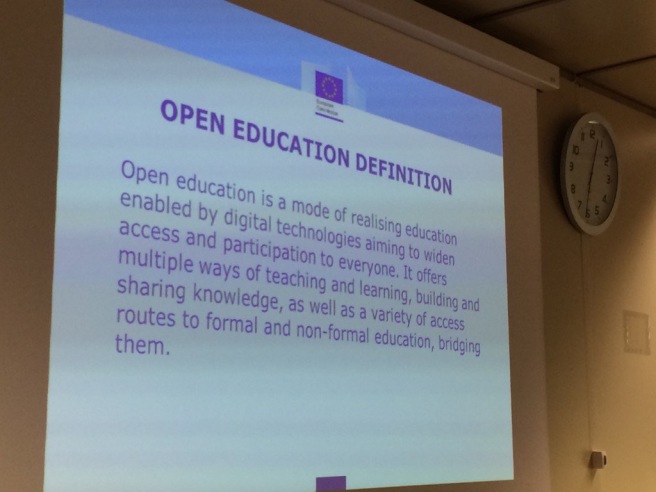I was lucky enough to be invited to attend an OpenEdu workshop at the end of November, hosted by the Institute for Prospective Technological Studies (IPTS), part of the European Commission’s Joint Research Centre, in Seville. There were 25 participants from 17 member states, and I think it’s fair to say that a wide range of views on open education in higher education was represented. The working definition for IPTS is –

The main focus was the OpenEdu project which aims to ‘propose a framework for opening up practices in higher education institutions’. The purpose of the workshop was to ‘sense check’ the draft strategic framework, and to get feedback on the extent to which it could be useful for European universities. More details on the draft framework and its dimensions are in the workshop slides.
The framework was welcomed although we felt that it was probably a bit too complicated in its current form. I could see how useful it could be though in clarifying what is meant by open education and in challenging some current assumptions, e.g that open is just about OERs or Moocs.
Participants also gave short updates on developments in their own institutions and countries. It was interesting to hear that universities in Greece are looking into the possibility of a shared open platform, while in Slovenia the priority is increasing the numbers of fee-paying students in universities rather than opening up education. I was able to feed in some information about the open education developments in Scotland, including the Scottish Open Education Declaration and the SFC funded OEPS project led by the OU in Scotland.
For those who like facts and figures, the IPTS also presented the findings of an interesting survey on open education practices in HE across France, Spain, Germany, the UK and Poland. They show that overall, 39% of respondents currently provide open education, with the UK well ahead at 63%. Around 22% of respondents currently offer Moocs and another 19% are considering them.
Use of OERs was more widespread with 51% of institutions already promoting them. Only 32% had a policy on open education though, so GCU’s OER policy is still keeping us ahead of the game. It wasn’t surprising to find that the need for staff CPD and a lack of formal academic recognition were cited as the major barriers to engagement with open education. It’s certainly something we need to keep moving on in GCU.
All in all it was a really useful couple of days, helped of course by blue skies, sunshine and some very tasty tapas!


